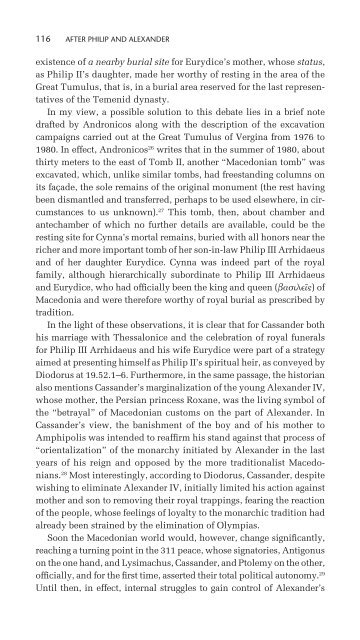Philip II and Alexander the Great: Father and Son ... - Historia Antigua
Philip II and Alexander the Great: Father and Son ... - Historia Antigua
Philip II and Alexander the Great: Father and Son ... - Historia Antigua
You also want an ePaper? Increase the reach of your titles
YUMPU automatically turns print PDFs into web optimized ePapers that Google loves.
116 AFTER PHILIP AND ALEXANDER<br />
existence of a nearby burial site for Eurydice’s mo<strong>the</strong>r, whose status,<br />
as <strong>Philip</strong> <strong>II</strong>’s daughter, made her worthy of resting in <strong>the</strong> area of <strong>the</strong><br />
<strong>Great</strong> Tumulus, that is, in a burial area reserved for <strong>the</strong> last representatives<br />
of <strong>the</strong> Temenid dynasty.<br />
In my view, a possible solution to this debate lies in a brief note<br />
drafted by Andronicos along with <strong>the</strong> description of <strong>the</strong> excavation<br />
campaigns carried out at <strong>the</strong> <strong>Great</strong> Tumulus of Vergina from 1976 to<br />
1980. In effect, Andronicos 26 writes that in <strong>the</strong> summer of 1980, about<br />
thirty meters to <strong>the</strong> east of Tomb <strong>II</strong>, ano<strong>the</strong>r “Macedonian tomb” was<br />
excavated, which, unlike similar tombs, had freest<strong>and</strong>ing columns on<br />
its fa çade, <strong>the</strong> sole remains of <strong>the</strong> original monument (<strong>the</strong> rest having<br />
been dismantled <strong>and</strong> transferred, perhaps to be used elsewhere, in circumstances<br />
to us unknown). 27 This tomb, <strong>the</strong>n, about chamber <strong>and</strong><br />
antechamber of which no fur<strong>the</strong>r details are available, could be <strong>the</strong><br />
resting site for Cynna’s mortal remains, buried with all honors near <strong>the</strong><br />
richer <strong>and</strong> more important tomb of her son-in-law <strong>Philip</strong> <strong>II</strong>I Arrhidaeus<br />
<strong>and</strong> of her daughter Eurydice. Cynna was indeed part of <strong>the</strong> royal<br />
family, although hierarchically subordinate to <strong>Philip</strong> <strong>II</strong>I Arrhidaeus<br />
<strong>and</strong> Eurydice, who had offi cially been <strong>the</strong> king <strong>and</strong> queen ( βασιλεῖς ) of<br />
Macedonia <strong>and</strong> were <strong>the</strong>refore worthy of royal burial as prescribed by<br />
tradition.<br />
In <strong>the</strong> light of <strong>the</strong>se observations, it is clear that for Cass<strong>and</strong>er both<br />
his marriage with Thessalonice <strong>and</strong> <strong>the</strong> celebration of royal funerals<br />
for <strong>Philip</strong> <strong>II</strong>I Arrhidaeus <strong>and</strong> his wife Eurydice were part of a strategy<br />
aimed at presenting himself as <strong>Philip</strong> <strong>II</strong>’s spiritual heir, as conveyed by<br />
Diodorus at 19.52.1–6. Fur<strong>the</strong>rmore, in <strong>the</strong> same passage, <strong>the</strong> historian<br />
also mentions Cass<strong>and</strong>er’s marginalization of <strong>the</strong> young Alex<strong>and</strong>er IV,<br />
whose mo<strong>the</strong>r, <strong>the</strong> Persian princess Roxane, was <strong>the</strong> living symbol of<br />
<strong>the</strong> “betrayal” of Macedonian customs on <strong>the</strong> part of Alex<strong>and</strong>er. In<br />
Cass<strong>and</strong>er’s view, <strong>the</strong> banishment of <strong>the</strong> boy <strong>and</strong> of his mo<strong>the</strong>r to<br />
Amphipolis was intended to reaffi rm his st<strong>and</strong> against that process of<br />
“orientalization” of <strong>the</strong> monarchy initiated by Alex<strong>and</strong>er in <strong>the</strong> last<br />
years of his reign <strong>and</strong> opposed by <strong>the</strong> more traditionalist Macedonians.<br />
28 Most interestingly, according to Diodorus, Cass<strong>and</strong>er, despite<br />
wishing to eliminate Alex<strong>and</strong>er IV, initially limited his action against<br />
mo<strong>the</strong>r <strong>and</strong> son to removing <strong>the</strong>ir royal trappings, fearing <strong>the</strong> reaction<br />
of <strong>the</strong> people, whose feelings of loyalty to <strong>the</strong> monarchic tradition had<br />
already been strained by <strong>the</strong> elimination of Olympias.<br />
Soon <strong>the</strong> Macedonian world would, however, change signifi cantly,<br />
reaching a turning point in <strong>the</strong> 311 peace, whose signatories, Antigonus<br />
on <strong>the</strong> one h<strong>and</strong>, <strong>and</strong> Lysimachus, Cass<strong>and</strong>er, <strong>and</strong> Ptolemy on <strong>the</strong> o<strong>the</strong>r,<br />
offi cially, <strong>and</strong> for <strong>the</strong> fi rst time, asserted <strong>the</strong>ir total political autonomy. 29<br />
Until <strong>the</strong>n, in effect, internal struggles to gain control of Alex<strong>and</strong>er’s

















